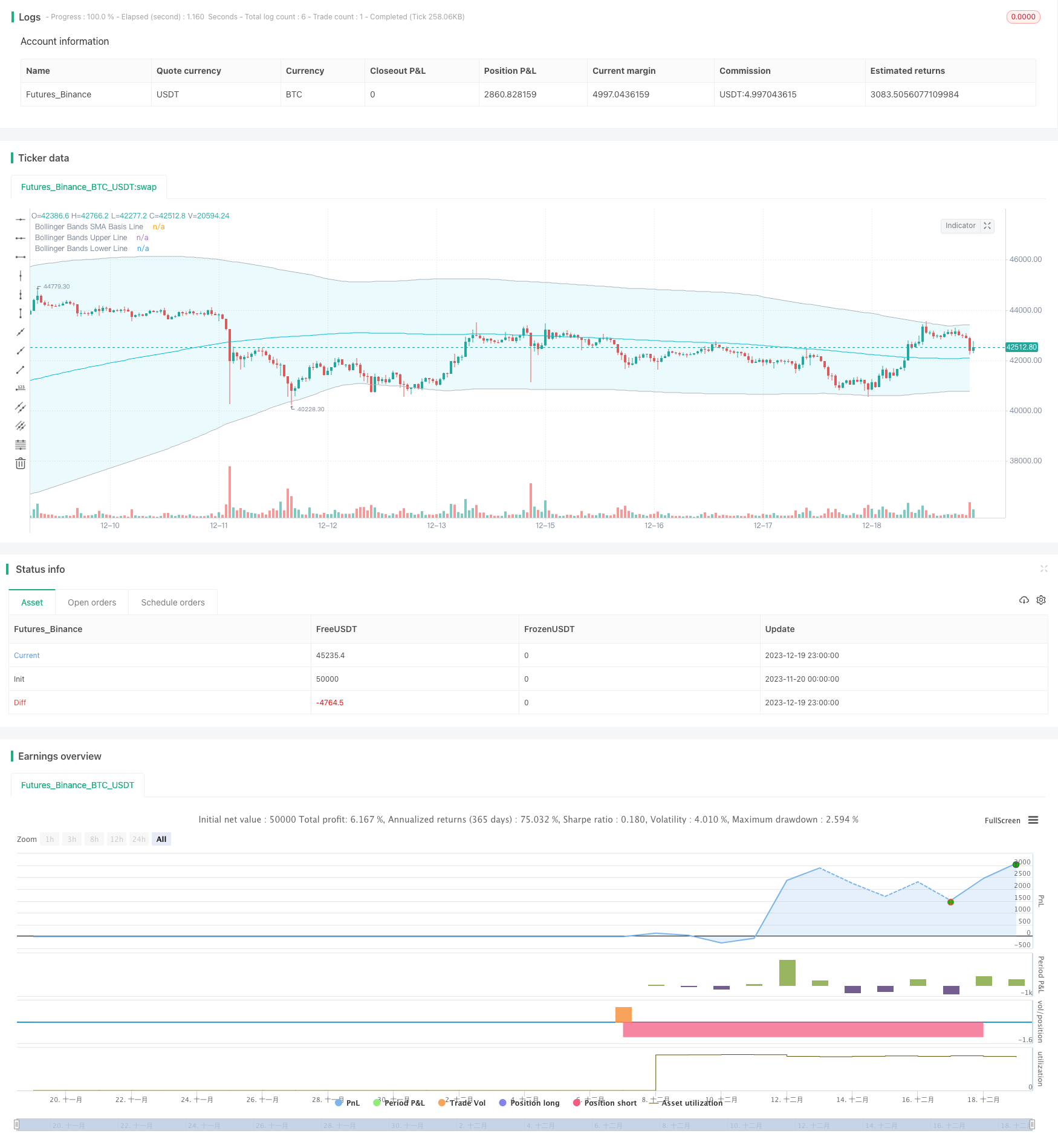
一、策略概述
本策略名称为RSI布林带止盈止损策略(RSI Bollinger Bands TP/SL Strategy)。该策略融合了RSI指标和布林带指标,实现了趋势定位和突破交易。当RSI指标出现超买超卖信号,并且价格触及或突破布林带上轨或下轨时,进行做多或做空操作。同时,策略还设置了止盈止损点,可以提高稳定性。
二、策略原理
1. RSI指标判断逆转
RSI指标可以判断股票是否处于超买超卖区间。当RSI大于设定的超买线时为超买,小于设定的超卖区间时为超卖。本策略设置超买线为50,超卖线为50。
2. 布林带判断趋势
布林带通过计算股价的标准差,得到股价的上下轨。上轨为阻力线,下轨为支撑线。当股价上穿下轨时为买点,下穿上轨时为卖点。
3. RSI指标与布林带指标结合
当RSI指标出现底部反转信号,同时股价突破布林带下轨时,认为行情由下向上反转,做多;当RSI指标出现顶部反转信号,同时股价跌破布林带上轨时,认为行情由上向下反转,做空。
三、策略优势
1. 双重指标过滤增加信号准确率
RSI指标和布林带指标都用于判断趋势和逆转点。两者结合使用,可以提高真正买卖信号的识别准确率,避免假突破。
2. 止盈止损机制控制风险
策略设置了止盈止损点,做多止盈点为入场价(1+止盈比例),止损点为入场价(1-止损比例);做空则相反,这可以锁定盈利,最大程度避免亏损,控制风险。
3. 可自定义买卖方向
策略可选择只做多、只做空或双向交易,用户可以根据市场环境选择不同方向,灵活控制风险。
四、策略风险
1. 布林带参数敏感
布林带的标准差大小影响布林带的宽度从而影响交易信号产生。如果参数设置不当,可能产生大量错误信号。
2. 止盈止损带来的风险
如果行情出现V型反转,止盈止损设置可能过于激进,造成不必要的亏损。
3. RSI参数敏感
RSI的参数也会影响RSI曲线的形态。如果RSI参数设置错误,则RSI反转信号准确性降低。
五、策略优化方向
1. 优化RSI参数
可以测试更多种RSI长度参数,找到最佳参数组合。
2. 优化布林带参数
可以测试更多种布林带长度和标准差参数,找到最佳参数组合。
3. 测试不同的止盈止损比例
可以通过回测找到最佳的止盈止损比例参数。
六、总结
本策略综合运用RSI指标和布林带指标判断趋势和逆转,加入止盈止损机制控制风险,可以自动识别买卖点并及时止损止盈。该策略也存在一定的风险,主要可通过参数优化等方法进行改进。总体而言,该策略具有较强的实用性。
/*backtest
start: 2023-11-20 00:00:00
end: 2023-12-20 00:00:00
period: 1h
basePeriod: 15m
exchanges: [{"eid":"Futures_Binance","currency":"BTC_USDT"}]
*/
// This source code is subject to the terms of the Mozilla Public License 2.0 at https://mozilla.org/MPL/2.0/
// © BigCoinHunter
//@version=5
strategy(title="RSI_Boll-TP/SL", overlay=true,
pyramiding=0, default_qty_type=strategy.percent_of_equity,
default_qty_value=100, initial_capital=1000,
currency=currency.USD, commission_value=0.05,
commission_type=strategy.commission.percent,
process_orders_on_close=true)
//----------- get the user inputs --------------
//---------- RSI -------------
price = input(close, title="Source")
RSIlength = input.int(defval=6,title="RSI Length")
RSIoverSold = input.int(defval=50, title="RSI OverSold", minval=1)
RSIoverBought = input.int(defval=50, title="RSI OverBought", minval=1)
//------- Bollinger Bands -----------
BBlength = input.int(defval=200, title="Bollinger Period Length", minval=1)
BBmult = input.float(defval=2.0, minval=0.001, maxval=50, step=0.1, title="Bollinger Bands Standard Deviation")
BBbasis = ta.sma(price, BBlength)
BBdev = BBmult * ta.stdev(price, BBlength)
BBupper = BBbasis + BBdev
BBlower = BBbasis - BBdev
source = close
buyEntry = ta.crossover(source, BBlower)
sellEntry = ta.crossunder(source, BBupper)
plot(BBbasis, color=color.aqua, title="Bollinger Bands SMA Basis Line")
p1 = plot(BBupper, color=color.silver, title="Bollinger Bands Upper Line")
p2 = plot(BBlower, color=color.silver, title="Bollinger Bands Lower Line")
fill(plot1=p1, plot2=p2, title="Bollinger BackGround", color=color.new(color.aqua,90), fillgaps=false, editable=true)
//---------- input TP/SL ---------------
tp = input.float(title="Take Profit:", defval=0.0, minval=0.0, maxval=100.0, step=0.1) * 0.01
sl = input.float(title="Stop Loss: ", defval=0.0, minval=0.0, maxval=100.0, step=0.1) * 0.01
longEntry = input.bool(defval=true, title= 'Long Entry', inline="11")
shortEntry = input.bool(defval=true, title='Short Entry', inline="11")
//---------- backtest range setup ------------
fromDay = input.int(defval = 1, title = "From Day", minval = 1, maxval = 31)
fromMonth = input.int(defval = 1, title = "From Month", minval = 1, maxval = 12)
fromYear = input.int(defval = 2021, title = "From Year", minval = 2010)
toDay = input.int(defval = 30, title = "To Day", minval = 1, maxval = 31)
toMonth = input.int(defval = 12, title = "To Month", minval = 1, maxval = 12)
toYear = input.int(defval = 2042, title = "To Year", minval = 2010)
//------------ time interval setup -----------
start = timestamp(fromYear, fromMonth, fromDay, 00, 00) // backtest start window
finish = timestamp(toYear, toMonth, toDay, 23, 59) // backtest finish window
window() => time >= start and time <= finish ? true : false // create function "within window of time"
//------- define the global variables ------
var bool long = true
var bool stoppedOutLong = false
var bool stoppedOutShort = false
//--------- Colors ---------------
TrendColor = RSIoverBought and (price[1] > BBupper and price < BBupper) and BBbasis < BBbasis[1] ? color.red : RSIoverSold and (price[1] < BBlower and price > BBlower) and BBbasis > BBbasis[1] ? color.green : na
//bgcolor(switch2?(color.new(TrendColor,50)):na)
//--------- calculate the input/output points -----------
longProfitPrice = strategy.position_avg_price * (1 + tp) // tp -> take profit percentage
longStopPrice = strategy.position_avg_price * (1 - sl) // sl -> stop loss percentage
shortProfitPrice = strategy.position_avg_price * (1 - tp)
shortStopPrice = strategy.position_avg_price * (1 + sl)
//---------- RSI + Bollinger Bands Strategy -------------
vrsi = ta.rsi(price, RSIlength)
rsiCrossOver = ta.crossover(vrsi, RSIoverSold)
rsiCrossUnder = ta.crossunder(vrsi, RSIoverBought)
BBCrossOver = ta.crossover(source, BBlower)
BBCrossUnder = ta.crossunder(source, BBupper)
if (not na(vrsi))
if rsiCrossOver and BBCrossOver
long := true
if rsiCrossUnder and BBCrossUnder
long := false
//------------------- determine buy and sell points ---------------------
buySignall = window() and long and (not stoppedOutLong)
sellSignall = window() and (not long) and (not stoppedOutShort)
//---------- execute the strategy -----------------
if(longEntry and shortEntry)
if long
strategy.entry("LONG", strategy.long, when = buySignall, comment = "ENTER LONG")
stoppedOutLong := true
stoppedOutShort := false
else
strategy.entry("SHORT", strategy.short, when = sellSignall, comment = "ENTER SHORT")
stoppedOutLong := false
stoppedOutShort := true
else if(longEntry)
strategy.entry("LONG", strategy.long, when = buySignall)
strategy.close("LONG", when = sellSignall)
if long
stoppedOutLong := true
else
stoppedOutLong := false
else if(shortEntry)
strategy.entry("SHORT", strategy.short, when = sellSignall)
strategy.close("SHORT", when = buySignall)
if not long
stoppedOutShort := true
else
stoppedOutShort := false
//----------------- take profit and stop loss -----------------
if(tp>0.0 and sl>0.0)
if ( strategy.position_size > 0 )
strategy.exit(id="LONG", limit=longProfitPrice, stop=longStopPrice, comment="Long TP/SL Trigger")
else if ( strategy.position_size < 0 )
strategy.exit(id="SHORT", limit=shortProfitPrice, stop=shortStopPrice, comment="Short TP/SL Trigger")
else if(tp>0.0)
if ( strategy.position_size > 0 )
strategy.exit(id="LONG", limit=longProfitPrice, comment="Long TP Trigger")
else if ( strategy.position_size < 0 )
strategy.exit(id="SHORT", limit=shortProfitPrice, comment="Short TP Trigger")
else if(sl>0.0)
if ( strategy.position_size > 0 )
strategy.exit(id="LONG", stop=longStopPrice, comment="Long SL Trigger")
else if ( strategy.position_size < 0 )
strategy.exit(id="SHORT", stop=shortStopPrice, comment="Short SL Trigger")